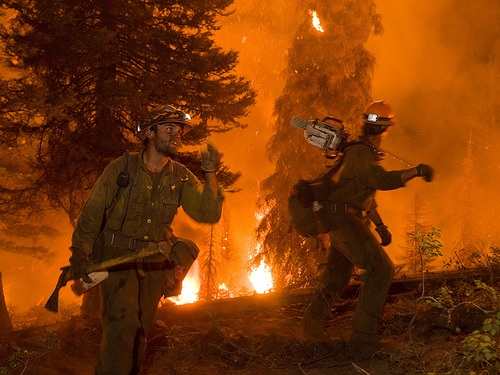 The group behind the creation of our national forest system – the Boone and Crockett Club – applauds Congressman Mike Simpson (R-ID) for introducing a bill to address the realities of today’s more frequent catastrophic wildfires. The Wildfire Disaster Funding Act of 2017 will allow the Forest Service to tap disaster funding, appropriately treating catastrophic wildfires like hurricanes and other natural disasters.
The group behind the creation of our national forest system – the Boone and Crockett Club – applauds Congressman Mike Simpson (R-ID) for introducing a bill to address the realities of today’s more frequent catastrophic wildfires. The Wildfire Disaster Funding Act of 2017 will allow the Forest Service to tap disaster funding, appropriately treating catastrophic wildfires like hurricanes and other natural disasters.
Fighting forest fires is the responsibility of the U.S. Forest Service, as is maintaining these lands for the betterment of the people. In a bad fire year these actions can represent up to 53 percent of the Forest Service’s annual budget. The consequence of which is the Service’s inability to do the fire prevention work necessary to keep fire events small and contained in the first place.
“Each year, especially in our Western states, we brace ourselves for fire season and each year we see more and more of the Forest Service’s management budget go up in smoke,” said Ben B. Hollingsworth, Jr., president of the Boone and Crockett Club. “In the legacy of our founder, Representative Simpson is to be commended for stepping up with common sense legislation to deal with keeping our federal forest lands in healthy, productive condition.”
Club founder, Theodore Roosevelt was a strong advocate for federal public lands managed for multiple use. When the Club established the national forest system and then the U.S. Forest Service, Roosevelt appointed fellow Club member Gifford Pinchot as its first chief in 1905. To date, nearly every Forest Service chief has been a Boone and Crockett Club member.
“It’s a vicious cycle we’ve been in,” explained Hollingsworth. “So much of the agency’s funds are going toward extinguishing larger and hotter fires that could have been minimalized by maintaining roads and managing overcrowded forest stands that fuel these disasters. But the funds they have for maintenance and prevention are spent fighting more frequent fires after they are burning. The Wildfire Disaster Funding Act of 2017 will allow the Forest Service to buck this trend by getting back to fire prevention, and mitigating the ones that do start.”
